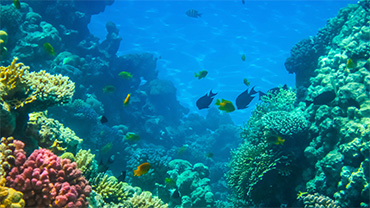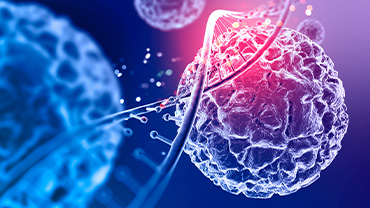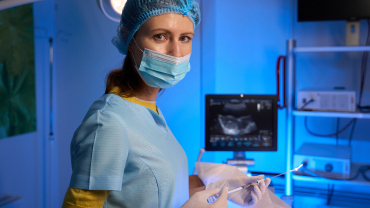-

-
The Institute has the ability to address virtually any question relating to biodiversity in its many facets, studying from genes to ecosystems, from morphology to behaviour, from molecular genetic variation to the quantitative one.
In it, it is performed both works of scientific excellence in basic research, such as expert opinion and consultancy in applied research problems (molecular epidemiology, pest control, conservation and protection of species, etc.)
-
Science and Technology Park C/ Catedràtic José Beltrán, 2
-
Research groups:
- Research Group on Marine Zoology (ZOOMAR)
- Ecology of Terrestrial Vertebrates (ECOTERAM)
- Entomology and Pest Control (ECP)
- Research Group on Ecology, Ethology and Evolution (e3)
- Systematics, Evolution and Biogeography of Fungi, Seaweeds and Plants (SEBHAP)
- Early Vertebrate Evolution Research-Group (EVER)
- Plant Conservation Biology (BCPUV)
- Research Group on Cnidarian Biodiversity and Evolution (BEC)
-
Scan me
-

-
The Foundation for the Promotion of Health and Biomedical Research of the Valencian Community (Fisabio) is a non-profit scientific organisation, whose primary purpose is to promote, favour, disseminate, develop and execute scientific-technical research and innovation in health and biomedicine in the area of the Valencian Community.
-
Other entities:
Generalitat Valenciana
-
Research groups:
-
Research projects:
-
Scan me
-

-
IDM is a Joint Centre of Interdisciplinary Researchers and the first inter-university centre in the Valencian Community, made up by researchers of both Valencian State Universities (UPV & UV).
The four strategic objectives of IDM are:
- To have interdisciplinary and inter-university workgroups. The first objective is to improve and use the knowledge and experience of the professors and researchers of the Universitat de València and the Universitat Politècnica de València, whose interests are similar. In this way, cooperation creates synergies and improves the efficiency of different types of work.
- Stablishing a solid and competitive research structure. In second place, it is expected to establish in the Valencian Community a competitive centre with quality and standing who implements itself into the Valencian territory and society. It is also expected to clearly become a national reference in the generation of knowledge.
- Creating Networking strategies. In third place, the IDM promotes the creation of mechanisms of cooperation with other similar national or international centres. The relationships with other centres have already grown stronger because of this.
- Guiding the scientific-technological capabilities in order to export its results. Thanks to the identification of the strong points of the institute, several companies from different sectors can be considered for joint company-IDM projects.
-
Inter-University Institute:
Universitat de València
Universitat Politècnica de València
Research building Av. Vicent Andrés Estellés, 19 4th floor. Office 4.35 -
Research groups:
- Research Group on Multivariate and Multicomponent Analysis - Quality and High-throughput Bioanalysis (GAMM-CyBAR)
-
Research projects:Desenvolupament de noves estratègies basades en la intel·ligència artificial per a la modelització intel·ligent en cromatografia líquida quiral Anàlisi en continu dels paràmetres de qualitat de l'aigua mitjançant fibra òptica. Desenvolupament de kits basats en sondes moleculars per a la detecció de drogues de submissió química Desenvolupament i validació de nanomaterials i sensors per promoure la competitivitat del sector agroalimentari Estratègies de diagnòstic i tractament en malalties inflamatòries cròniques articulars i de la pell Estudi SePkLin
-
Scan me
-

-
Created in the year 2008, the Image Processing Laboratory (IPL) from the Universitat de València is a IRS (Interdisciplinary Research Structure; ERI in Spanish) composed of four research groups (UGC, GPDS, GACE and LEO) with a technological mission in common: imaging (creation of real images or geobiophysical parameters) from satellite information and teledetection.
-
-
Research groups:
-
Research projects:
-
Scan me
-
-
The I2SysBio is a joint research institute involving Universitat de València (UV) and Spanish Research Council (CSIC), open to strategic alliances with biotech companies. The institute is located in a building that was completed at the end of 2015 in the Scientific Park (Parc Científic, Campus Burjassot-Paterna) at the UV. The foundational agreement of I2SysBio was signed by CSIC and UV in March 2016. The first research groups moved to the new building in March 2017, and the centre was officially inaugurated in February 2018.
-
Other entities:
CSIC
-
Research groups:
- Environmental and Biomedical Viruses: Applications of Bacteriophages and Other Viruses in Global Health (EnBiVir)
- Transcriptional Orchestration of Plant Secondary MetaboliSm (TOMSlab)
-
Research projects:
-
Scan me
-

-
The IEI is a centre of research, transfer of knowledge to society and postgraduate training. Its creation in 1995 was done by the University of Alicante (IEI Alicante), the Universitat Jaume I of Castellón (IEI Castellón) and the Universitat de València (IEI UV), from which the IEI takes part as a Inter-university Institute.
The main objective of the Institute is to foster a research, formation and knowledge transference platform with an open nature, multidisciplinary and of the highest academic level through its own researchers and their collaboration with other specialists and research groups. The fields in which the IEI in Valencia operates are, in a broad sense, the Analysis on Economics and the Analysis on Corporate Reality.
The IEI, in order to work, receives basic funding from the universities mentioned and financial support from other public and private entities through projects, agreements and contracts for the realization of specific works inside the lines of research of the Institute or from others who, because of its socioeconomic transcendence, are of interest for their environment. A part from other projects of interest, which you can find in the section of Contracts and Projects (Proyectos y Contratos) in the web, the IEI Valencia is currently in charge of the Chair of Port Economics, constituted through the collaboration between the Port Authority of Valencia and the Universitat de València.
-
Inter-University Institute:
Universitat de València
Universitat d'Alacant
Universitat Jaume I
-
Research groups:
- Quality and Economic Effects of Financial Information: Regulation, Audit, Internal Management and Institutional Environment (FINECO)
- Corporate Information: Transparency and Disclosure (INCOTRAD)
- Research Group on Marketing and Innovation in Retailing and Services (INNOMARK)
- Research Group on Marketing, Internationalisation and Management of the Distribution Channel (MARKINADIS)
- Service, Innovation, Value (SIV)
-
Research projects:
-
Scan me
-
-
The ICMol was founded in 2000 to develop a competitive and high-quality research in materials science using a molecular approach. In fact, ICMol is the sole research centre in Spain exclusively focused on the molecular aspects of Nanoscience, with a special emphasis on the study of functional molecules and materials exhibiting useful magnetic, electrical or optical properties.
In 2016, ICMol was recognized by the Spanish Ministry as Unit of Excellence María de Maeztu for a four-year period, from 2016 to 2019. In 2020, this accreditation has been renewed for another four-year period, from 2020 to 2023.
-
Science and Technology Park C/ Catedràtic José Beltrán, 2
-
Research groups:
- Quantum Chemistry of the Excited State (QCEXVAL)
- Molecular Optoelectronic Devices Team (MOED)
- Functional Inorganic Materials (FuniMAT)
- Multifunctional Porous Materials (Mupomat)
-
Research projects:
-
Scan me
-

-
The Institute of Corpuscular Physics is a joint centre between the Spanish Research Council (Consejo Superior de Investigaciones Científicas, CSIC) and the Universitat de València devoted to research in Nuclear, Particle and Astroparticle Physics and its applications to Medical Physics and to other fields of Science and Technology.
What can be considered as the recent period of the Institute of Corpuscular Physics started in July 1985 when the Universitat de València and the Spanish National Research Council signed a cooperation agreement by which a joint institute of shared ownership was created under the regulations provided by the framework cooperation agreement between both organizations that had been signed at the end of 1983. This joint centre kept its previous name in order to honour the tradition of Valencia in the field of Nuclear and Particle Physics that already had more than 30 years of history at that time.
In the new institute converged experimental and theoretical physicists and, in addition to the lecturers and professors of the Universitat de València, this institute was joined in the following years by Spanish and foreign researchers who worked in several institutions abroad.
In 2015, IFIC was awarded with the ‘Severo Ochoa’ accreditation as centre of excellence in recognition of its outstanding performance and scientific contributions at national and international level, its impact at industrial and social level, and the ability to attract scientific talent.
-
Other entities:
CSIC
Science and Technology Park C/ Catedràtic José Beltrán, 2 -
Research groups:
- Experimental High Energy Physics at Colliders (IFIC-EHEP)
-
Research projects:
-
Scan me
-

-
The Institute of Human Rights was established in March 2005 as a dedicated research centre within the Universitat de València, specialising in multidisciplinary studies of human rights. The Institute brings together researchers from different legal and social branches with the objective of pursuing a set of fundamental goals. Thus, the Institute’s objective is to advance the knowledge of human rights through multidisciplinary research, training and awareness-raising activities. Its teaching work is designed to promote reflection, dialogue and commitment to human rights, with a particular focus on the most vulnerable or most threatened individuals and groups.
The Institute of Human Rights is structured around several interdisciplinary research areas. In addition to these research and study areas, the IDH actively promotes human rights education through postgraduate teaching and specialisation in human rights issues. These activities are made possible to a significant extent thanks to collaboration agreements with other research and teaching centres in this field, both in Spain and abroad. Furthermore, the IDH collaborates with NGOs and social movements that are dedicated to the defence and protection of the human rights of vulnerable groups. In order to foster social awareness, the IDH organises activities and conferences with distinguished guests of national and international prestige.
-
-
Research groups:
-
Research projects:Temps i espais d'una justícia inclusiva. Drets per a una societat resilient enfront dels nous reptes (IN_JUSTICE) Multiplying educational capacities to combat sexual violence against children (EDUCAP) Migració, canvi climàtic i cooperació al desenvolupament: fluxos, impactes i coherència de polítiques al Marroc i el Senegal en relació amb Espanya (MIGRACLIMA)
-
Scan me
-

-
The origin of the IULMA was the creation of a research unit called CETIVA (Centre for Industrial Terminology of the Autonomous Region of Valencia) in the University of Alicante by Doctor Enrique Alcaraz Varó, who lead the research group “Professional and academic English (APA)” at the heart of which many relevant initiatives have been carried out. We must emphasize the bilingual dictionaries specialized in several professional areas that were arisen in CETIVA and now are published as IULMA. Dictionaries that compile different subjects such as Economic Law, Leisure, Tourism, Banking, Foreign Trade, Real Estate, Insurances, Linguistics, Pharmaceutical Science, Footwear, Natural Stone or Human Rights.
-
Inter-University Institute:
Universitat de València
University of Alicante
Universitat Jaume I
-
Research groups:
- Group of Support for Investigation in Language Variation Analysis (SILVAGroup)
- Corpus Linguistics: Ddevelopments and Applications (CORPLING)
- Digital Genres: Linguistic Analysis of Production and Reception (GENDIGIT)
-
Research projects:
-
Scan me
-

-
Inter-university Institute for Valencian Language Studies
In 1978 the University Institute for Valencian Language is created (O.M 11 July, BOE 18-X-1978) as a scientific organism of the Universitat de València; this initiative is conceived by professor Manuel Sanchis Guarner, its first director. After his death, professors Joan Fuster, Antoni Ferrando, Rafael Alemany, Manuel Pérez Saldanya (as acting director), Joan J. Ponsoda and Ferran Carbó assumed the position.
The main aim of the IIFV is the linguistic and literary study of the Valencian language, within the general framework of Catalan language and literature. Apart from its educational and scientific purposes, the IIFV has, among its competences, the advice on every area related to Valencian literature and language. On the agreement for the establishment of the IIFV it is said that, despite the autonomy of each university, the IIFV will be the only organism that, in the name of all the universities that are part of it, could advise and rule on its philological fields of competence. -
Inter-University Institute:
Universitat de València
University of Alicante
Universitat Jaume I
-
Research groups:
-
Research projects:
-
Scan me
-

-
The Institute for Local Development of the Universitat de València is, in its broadest sense, a research and practical and theoretical centre in the field of local development. It is part of the Inter-University Institute for Local Development (IIDL), established by the researchers of the Universitat Jaume I (UJI) and Universitat de València, experts in the various dimensions of the concept of sustainable development, policy implementation framework and development strategies on a local level.
Research at IIDL is structured in four areas. Each of them incorporates in turn, the different aspects and strategies addressed on a thematic level based on the characteristics and content of the research. -
Inter-University Institute:
Universitat de València
Universitat de Jaume I
Research Institutes building C/Serpis, 29-4ª -
Research groups:
- Sustainable Local Development and Government (GDLS)
- Social Studies Group Intervention and Innovation (GESinn)
- Grup d'Investigació en Desenvolupament Territorial de la Universitat de València (GRIDET)
- Innovation and Local Development (INNODES)
- Research Group on Local and Regional Sustainability (LOCSUS)
- Research Group on Community Social Services (SESOCO)
- Unit for Rural Development and Evaluation of Public Policies (UDERVAL)
-
Scan me
-

-
ERI-CES (Interdisciplinary Research Structure - Socioeconomic Behaviour Research Group) is a research group created in 2006 by the Universitat de València.
This research group is located in the Research Facilities of the Faculty of Social Sciences in the Universitat de València, Tarongers Campus (Spain).
The lines of research include: Microeconomics and Strategic Economic Behaviour, Socioeconomic Behaviour in the Labour Markets, Behavioural Economics, Applied Industrial Economics and Quantitative Methodology, Industrial Economics, Environmental Economics and Transport Economics and Resources.
ERI-CES has a laboratory, LINEEX, for research in experimental and computational economy.
-
-
Research groups:
-
Research projects:
-
Scan me
-

-
ERI-Reading is a research structure created in the Universitat de València in order to promote research in reading and disseminate the research results of its member groups. It is made up of internationally renowned researchers from the universities of Valencia, Salamanca, Oviedo, Basque Country, Zaragoza and Barcelona. ERI-Reading has developed technological products to research, evaluate and improve reading skills. ERI-Reading combines laboratory research with sophisticated instruments for the analysis of reading processes and applied research in everyday reading situations. The main research lines are the following:
- Reading processes in alphabetic and non-alphabetic languages
- Reading in people with disabilities
- Dyslexia
- Neuropsychology of reading
- Reading in technological environments
- Reading promotion from web 2.0
- Teaching reading skills
- Literature, reading and writing
- Reading comprehension and intellectual and hearing impairment
ERI promotes a doctoral programme in Reading and Comprehension in the universities of Salamanca, Oviedo and Valencia. ERI collaborates with institutions, organisms and companies dedicated to reading.
-
-
Research groups:
-
Scan me
-

-
The López Piñero Inter-university Institute is a centre dedicated to research and dissemination around historical and social studies about medicine, technology, science and the environment. It has its own master's degree and doctorate in “History of Science and Scientific Communication” and carries out many activities about scientific dissemination. The Institute is located in the restored 18th century palace in the centre of the city of Valencia, where you can also find the Biblioteca Historicomédica (Historical Medical Library) and the Universitat de València scientific and medic collection, with permanent and temporal monographic exhibitions.
-
Inter-University Institute:
Universitat de València
Miguel Hernández University
Universitat Jaume I
-
Research groups:
- History of Science, Medicine and Technology (HCMT)
- Research Group on Sustainability Studies (ESDESOST)
- History of Scientific and Technical Translation in Spain (18th-20th Century) (Histradcyt)
-
Scan me
-

-
The Research Institute of Personnel Psychology, Organizational Development and Quality of Working Life (IDOCAL) aims to promote, from the academic field, a research to improve both the quality of life of people and the functioning of the organizations.
In order to do this, the IDOCAL develops different lines of research and participates in different training projects for future professionals. In relation to this last aspect, it coordinates the Doctoral Programme in Psychology of Human Resources, taught by the Universitat de València and the University of Seville, and aimed at training high-level researchers and professionals in the field of Psychology of Human Resources. -
-
Research groups:
- Laboratory of Social Cognitive Neuroscience (LabNSC)
-
Research projects:Estrés, regulació emocional i funció cognitiva en persones amb queixes subjectives de memòria Molecular mechanisms of the (cognitive and motor) alterations in hyperammonemia and hepatic encephalopathy. Therapeutic implications. Implicacions del lideratge femení en la relació sostenible entre el benestar i el rendiment laboral: un enfocament de gènere Digitalització del treball docent i competències digitals del professorat: implicacions per al seu benestar i acompliment La influència de la robotizació sobre les característiques dels llocs de treball i els resultats del treball Desenvolupament de les competències de lideratge per a millorar el benestar i l'acompliment dels teletrebajadors: avaluació d'un programa de formació a través de web i app
-
Scan me
-

-
The Research University Institute in Social Economy, Cooperative Economy and Entrepreneurship (IUDESCOOP), is, in its broadest sense, a center of research, information, and theoretical and practical specialization in the field of social and cooperative economy. It is a UV-specific research Institute.
-
Other entities:
Generalitat Valenciana
-
Research groups:
-
Scan me
-

-
The Desertification Research Centre (CIDE) is a public centre of scientific research. Due to our mix centre nature, during our procedure three institutions intervene: the State Agency Spanish Research Council (CSIC), Universitat de València (UV) and the Government of the Valencian Community (GVA), through the Valencian Department of Agriculture, Rural Development, Climatic Emergency and Ecologic Transition and the Valencian Department of Innovation, Universities, Science and Digital Society.
Inside the CIDE we work, from their origin, to give based knowledge on scientific evidence and to communicate our society the transcendence of environmental issues, more specifically, about the risk and the potential impact of desertification and climatic change in the ecosystems and the human being, contributing, this way, to the protection of our surroundings. In this sense, we are one of the pioneer centres in Europe in the study of desertification and one of the few institutes dedicated to the topic, with a solid base and a wide experience on the study of the process of earth, water and the ecosystems degradation, mostly the Mediterranean ecosystems. In constant evolution, our strategic goals, collected inside our Action Plans, are aligned with the Sustainable Development Goals. -
Other entities:
CSIC
Generalitat Valenciana
Carretera Montcada-Nàquera, Km 4,5 Apartat Oficial -
Research groups:
-
Research projects:
-
Scan me
-

-
The Institute of Material Science (ICMUV), created by Decree of the Valencian Government 36/1995 on 7 March 1995 (DOGV num. 2469), had its origin on an initiative lead by a group of Research Units in the Faculties of Chemistry and Physics of the UV in order to face the need of establishing a synergic interactive link of their competences directed towards applied Chemistry and Physics aiming at offering their effort for the resolution of practical problems related to companies in our Community which belong to the field of Material Sciences.
-
Science and Technology Park C/ Catedràtic José Beltrán, 2
-
Research groups:
-
Research projects:
-
Scan me
-

-
BIOTECMED is a Higher Cooperative Research Institute and a research institute from the UV in the field of molecular biology applied to Biotechnology and Biomedicine with two fundamental objectives:
- Scientific excellence: to foster and promote research in basic and applied molecular biology at the Universitat de València, improving the interaction between related groups of scientific quality contrasted by external committees.
- Transferability: to push forward technological transfer activities articulating interactions with companies, specially with those from the Science Park and the UV business incubator in the fields of biotechnology and biomedicine.
-
Other entities:
Generalitat Valenciana
Genetics Department Faculty of Biological Sciences Av. Vicent Andrés Estellés, 19 -
Research groups:
- Cardiovascular Pharmacology (FarCardVas)
- Neuroplasticity (NBL)
- Molecular Neurobiology (NEUROMOL)
- Human Translational Genomics (GT)
- Molecular Genetics of Development and Biomedical Models (GMDMB)
- Immunology of Fungal Infections Teams (GIIF)
- Cell Cycle Regulation in Eukaryotes (CC)
- Eukaryotic gene expression: from DNA to protein (EGE-DtoP)
- Biotechnological Pest Control (CPB)
- Extracellular Matrix Proteins and Cell Adhesion (ProMaEx)
- Protein Trafficking (TRAFIPROT)
- Research Group on Membrane Proteins (MemProt Lab)
- Primary Metabolism and Metabolic Engineering of Plants (MePiVe)
- Biotechnology Applied to Forest and Aromatic Species (BIOFORA)
-
Research projects:
-
Scan me
-

-
The University Institute of Creativity and Educational Innovations came up from the initiative by the Full University Professor of General Pedagogy and, in the past, Dean of the Faculty of Philosophy and Education Sciences, Mr. Ricardo Marín Ibañez, and by the Full University Professor of Aesthetics of the same Faculty, Mr Romà de la Callle.
The Institute was created by ministerial order on 26 October 1978 (BOE 24 November). In November 1986 it was approved its transformation into a University Institute.
It is one of the oldest Institutes of the Universitat de València and consists of two sections: Educational Innovations and Aesthetic Innovations.
-
C/ Serpis, 29 Research Institutes Building, fourth floor
-
Research groups:
-
Research projects:
-
Scan me
-

-
The University Institute of Women Studies of the Universitat de València (IUED) is an interdisciplinary research institute comprising professors, researchers and postgraduate education students. It also collaborates with other professors and researchers, with whom it maintains scientific relations and shares projects or lines of research.
The IUED collaborates with academic and institutional entities: the Institute for Women (Ministry of Health, Social Services and Equality), Directorate General of Dona of the Valencian Department of Social Welfare (Generalitat Valenciana), Asociación Universitaria de Estudios de las Mujeres (AUDEM), Ediciones Cátedra (Feminisms Collection) and other Spanish, European and American universities.
-
C/ Serpis, 29 Research Institutes Building. Floor 4
-
Research groups:
- Socioeconomic Inequalities and Public Policies with a Gender Perspective (GENDESPOL)
- Gender, Knowledge, History and Subjectivity (GECOHIS)
-
Research projects:
-
Scan me
-

-
The University Research Institute of Criminology and Criminal Science of the Universitat de València has the following objectives:
- To encourage research and specialization in theory and practice in all the fields related to Criminology and Criminal Science.
- To coordinate efficiently the efforts, researches and interdisciplinary acts in order to achieve a better knowledge of the criminal reality.
- To teach specialized training and perfection to all professionals implied or interested in the field, and to provide dissemination of the topics and subject areas related to the field.
- To serve public and private institutions with advice, opinion and realization of studies and projects in the broad field of Criminology and Criminal Science.
- To encourage and participate in agreements of scientific, technical and educational cooperation with public and private institutions of a local, autonomous, national or international character that are related, directly or indirectly, with the field of the Institute.
- To encourage contact with international groups who work in the same field with the purpose of strengthen scientific exchanges between all the groups who research in the field of Criminology and Criminal Science.
-
Faculty of Law Av. dels Tarongers, s/n
-
Research groups:
- Research Group on Dangerousness Criminal Law (DERPEligro)
- Modern Trends in Criminal Law and Criminology: Prevention and Protection of Civil Liberties (DPC)
-
Scan me
-

-
The IRTIC (Institute on Robotics and Information and Communication Technologies) is a university research centre dependent of the Universitat de València which currently consists of three research groups which cover different disciplines connected with the field of information and communication technologies.
Since its foundation at the beginning of 90s, the institute has tried to stablish collaboration frameworks with public entities and private companies with the object of promoting the interchange of knowledge and for bringing the research closer to business world. IRTIC mainly develops activities of applied research and of development of tailored solutions, while fomenting the guidelines that provide benefits to society. These activities are projects and contracts about systems of information management, telematics applications to traffic and transportation, computer graphics and virtual reality, systems of disabled integration, civil machinery simulation, network services and computer security and digital process of images.
-
Science and Technology Park C/ Catedràtic José Beltrán, 2
-
Research groups:
-
Research projects:
-
Scan me
-
-
Research Institute on Social Welfare Policy (Polibienestar) is a UV’s public research institute of international reference, specialised in social research, innovation and technology, technical assistance, and social policy training.
Interdisciplinary team composed of more than 100 researchers from different disciplines from the Universitat de València, 9 other associated Spanish universities and another 3 international universities.
-
C/ Serpis, nº 29, 2, 2 Research Institutes building
-
Research groups:
-
Research projects:
-
Scan me
-

-
INTRAS (Institute of Research on Traffic and Road Safety) is an interdisciplinary research centre of the UV (Universitat de València) specialized in the realization of advice, research, development, innovation, training and dissemination projects in the field of Transport, Traffic, Mobility and Road Safety.
-
Research Institutes Building, fourth floor C/ Serpis, 29, 2.2
-
Research groups:
-
Research projects:
-
Scan me
-

-
IVIRMA is the largest group in the world devoted exclusively to human Assisted Reproduction Technology. Along with the great privilege of providing fertility care to our patients, IVIRMA embraces the great responsibility of advancing the field of human reproduction. IVIRMA Global Research Alliance, as one of the pillars of IVIRMA Global, is a renowned leader in fertility research and science.
-
-
Research groups:
-
Research projects:
-
Scan me
-

-
IVIE is a center devoted to developing, fostering and projecting economic research at a national and international level. To meet these objectives, the Institute:
- Conducts studies and research related to areas of specific needs
- Creates databases which improve economic information
- Encourages the training of specialized personnel and the reinforcement of groups of specialists, thus safeguarding the continuity of diverse lines of economic research in the general interest
- Establishes links between research work and the decisions taken by economic agents
- Offers information and technical assistance on economic issues to the institutions and public or private companies that request it
- Fosters relations with national and international scientific institutions, promoting the development of collaboration networks
- Promotes the organization of scientific congresses and meetings
-
C/ Guàrdia Civil, 22 esc. 2 1(access from C/ Daniel Balaciart, 3 ground floor)
-
Research groups:
-
Research projects:
-
Scan me


